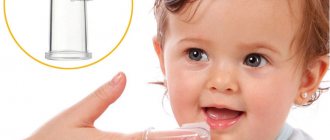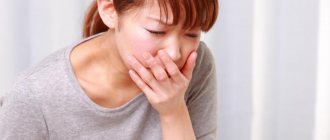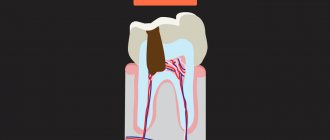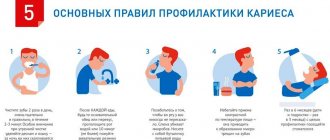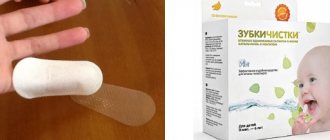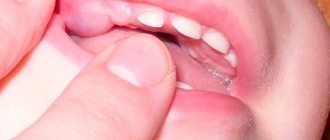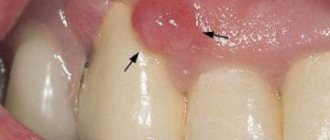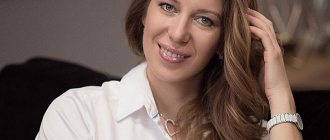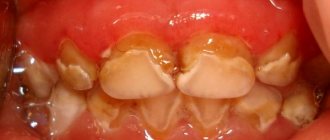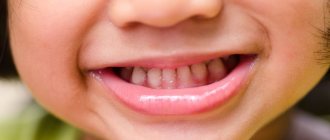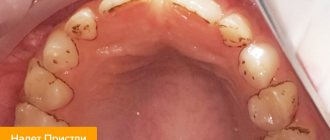As your child gets older, his “gummy smile” is replaced by baby teeth. Although these teeth are small, they play an important role in holding space for molars. It is very important to take care of baby teeth and prevent their decay. Otherwise, the baby will not be able to speak clearly and chew food normally. Therefore, most parents wonder when to start brushing their child's teeth to keep them healthy. In this article, you will not only find the answer to this question, but also learn how to properly clean and protect baby teeth.
When should you start brushing your baby teeth?
As soon as the first baby tooth appears. Thus, the child will get used to this process from an early age. Everything is individual, but usually the lower front tooth comes out first when the baby is six months old. For most children, all of their baby teeth erupt at 2-2.5 years of age (read “The order of teething in a child”).
It is necessary to take care of your baby’s teeth until he is seven years old, until he can take proper care of them.
How to care for baby teeth?
METHODS
DESCRIPTION
Brush your teeth twice a day
Ideally, this should be done in the morning and evening after dinner.
Make light circular movements
Use a thin layer of toothpaste that covers about 3/4 of the bristles. Use light and small circular movements and focus on the areas where the teeth and gums meet. Never use excessive force when cleaning as this may cause pain to the child.
Spitting
Teach your baby to spit out the remaining toothpaste after brushing, but not to rinse his mouth, so that the paste is more effective.
Turn the child in the opposite direction from you
The easiest way to reach all the teeth is if the child is sitting on your lap and his head is turned away from you.
Let your child hold the brush
If your baby holds the brush, this will allow him to feel some control over the process. You can even let him brush his teeth on his own under your supervision.
Brush your teeth before your child
When you brush your teeth in front of your baby, you set an example and teach him hygiene.
Talk to your dentist
If you need more information about brushing baby teeth, you can get it from your dentist.
You can also read the opinions of the popular pediatrician, Dr. Komarovsky, about when you should start brushing your baby’s teeth:
Recommendations for parents
- Brushing your teeth should not be a routine task for your child. Let it be in a playful way. So that the baby wants to repeat the procedure again and again.
- At the initial stage of your child’s education, your priority is to develop a habit, and not to teach the correct manual skills (how to hold a brush and how to move it, how long to brush your teeth, etc.). First, the baby must understand the importance of what he is doing, become interested, be inspired, and only then begin to follow the process itself.
- Therefore, after your little one brushes her teeth, be sure to check the result and clean them. Explain that not all evil caries were driven away by the child. Next time, let him try to reach with a brush all the nooks and crannies where they might be hiding.
Your child’s healthy, white-toothed smile in the future depends entirely on your patience, your perseverance and responsibility in the present.
Forming your child’s skills and established habit of brushing their teeth depends entirely on you. Be patient and moderately persistent. Your reward will be your child’s beautiful and happy smile for many, many years. And the knowledge that it was you who helped preserve this white-toothed smile.
How to protect baby teeth?
METHODS
DESCRIPTION
Reduce your sugar intake
Sweet foods (including dried fruits) can only be eaten during scheduled meals and a maximum of four times a day.
Be careful with drinks
Give your baby breast milk, formula, or water. Other drinks contain too much sugar.
Use different drinking methods depending on age
Try to give your baby a glass when he is already six months old, and do not allow him to use a bottle at the age of one year. From now on, he should only drink water at night.
Eat a Healthy Diet
Give your children a healthy, balanced diet of tasty, sugar-free foods.
Check products before consumption
Always review the ingredient list of baby food products as they may contain sugar.
Frequently asked questions about cleaning baby teeth
Once parents have learned when to start brushing their child’s teeth, they have the following logical questions: how to do it correctly and how to brush the baby’s first teeth?
How to choose a baby brush?
- Clean with gauze or muslin. Some parents find that the easiest way to clean first teeth is to wrap a piece of gauze or muslin around your finger, add a little toothpaste, and rub the child's teeth and gums.
- Soft brush. Use a soft brush with an angled head to reach all the nooks and crannies of your mouth. Age restrictions are usually indicated on the packaging.
- Change your toothbrush regularly. Replace your brush at least every three months, or if you notice that the bristles are already spreading out in different directions.
How to choose children's toothpaste?
- Content of fluoride compounds. It is the active ingredient in toothpaste that prevents tooth decay. But in large quantities it is dangerous. Children under 3 years of age should use toothpaste with low fluoride content (about 1000 parts per million). Children over 3 years of age can use regular toothpastes as long as they contain no more than 1350-1500 parts per million.
- A small amount of. When brushing children's teeth, you should always use the recommended amount (that is, a small amount) of toothpaste and ensure that the child spits out the rest (if he is old enough to do so).
- Harm from large doses. If your child has too much fluoride in his body, it can cause stains on his teeth, as well as diarrhea and vomiting. If your child instinctively swallows toothpaste, use brands that contain no more than 550 parts per million. In this case, the child is not in danger of receiving a large dose of fluoride compounds, even if they are added to tap water.
Dr. Komarovsky’s opinion on what and how best to brush a child’s first teeth:
Is it better to give your child fluoride supplements?
Some children need fluoride supplements, but you should only use them as directed by your doctor and in appropriate doses.
- If your water supply uses fluoride, you likely won't need a supplement. But they can still be used.
- You can check with your dentist or local water company about fluoride levels in your water.
- Make sure your child does not receive too much fluoride.
When can you take your child to the dentist?
Always take your child with you when you go to the dentist. This way he will get used to the situation. Of course, this does not apply to those cases when you yourself are afraid of dentists. This is how fear can develop in a child. The techniques of different dentists differ. Some may perform checks on children as early as six months, while others prefer to do this when the first teeth appear (read "child's first visit to the dentist").
At what age should a child brush his teeth?
You need to start taking care of your teeth even before they appear. In places where teeth will soon appear, white plaques from food debris and plaque form. They must be removed, because they are teeming with pathogenic bacteria.
You need to start brushing your teeth as soon as they appear. A mother should brush her child’s teeth until he is 5-6 years old, because... Until this age, the baby cannot yet perform this procedure efficiently. After the child learns to do this on his own, the mother must still supervise the process of brushing his teeth until he is 12-14 years old. Teenagers often forget to brush their teeth or try to do it quickly. Mom should remind her child why it is so important to regularly and carefully monitor oral hygiene.
Komarovsky's recommendations
The famous doctor Komarovsky recommends starting the process of oral care as early as possible.
But do not make this procedure violent. The process should give the little one pleasure and be a game. If the child resists, then you can wait until a more conscious age, up to 2-3 years. You will have to take care of your baby's teeth until he is 7 years old, until he learns to take proper care of them.
The task of parents is not to force, but to interest and teach hygiene.
But for oral health, certain conditions must be met:
- Diet mode (do not overeat at night, do not feed 24 hours a day).
- Clean cool air in the room, do not allow saliva to dry out.
- Drink clean water at night.
Each parent has the right to decide when to begin accustoming their child to daily oral care. Timely oral hygiene is the key to health and a beautiful smile.
How to properly brush children's teeth
Now you know that you need to brush your teeth immediately after they appear, all that remains is to figure out how to brush your child’s teeth according to all the rules. First you need to get everything you need for this process:
- Gauze swab or bandage to remove plaque. Don't use cotton wool. It scratches children's delicate teeth and leaves fibers in the mouth.
- Special wipes for children's oral hygiene. They clean teeth, gums, lips, and prevent thrush.
- Silicone finger brush for children up to 1 year.
- Classic baby brush for children over 1 year old. She has soft bristles, a small head and a short, comfortable handle.
- Gel for cleaning the oral cavity without taste or with a milky taste for babies who are still unfamiliar with complementary feeding.
- Children's fruit or berry paste for children who are already receiving complementary foods.
Mom should thoroughly clean both the inner and outer surfaces of her teeth 1-2 times a day. We must not forget about the tongue, because a lot of bacteria collect on it. It is cleaned with a piece of gauze or a special “grater” on the back of a toothbrush.
There is nothing too complicated about brushing children's teeth. The modern mother comes to the aid of many special brushes and other things for baby’s oral hygiene. But if you still find it difficult to understand this process or are worried that you are doing something wrong, be sure to consult a dentist.
Preparation
Experts believe that the very first step on this path is the procedure of cleansing the child’s gums with a special fingertip while still in infancy.
This is useful not only from the point of view of hygiene (removing accumulated food), but also psychologically - it accustoms the baby to the fact that the mother does not cause any pain when carrying out some manipulations in his mouth. A child has an innate trust in his mother’s hands and their touch. The child expects only affection, warmth and help from them. Do not dissuade him from this - care for his gums with tenderness and accuracy. The appearance of the first baby teeth may be accompanied by pain, so during this period, when caring for children’s teeth, it is necessary to exercise maximum caution and delicacy. This is the time to buy your child's first toothbrush. It should have a small, rounded cleaning head with ultra-soft bristles. The handle should fit comfortably in the parent's palm.
At what age can children brush their teeth?
The health of molars cannot but depend on oral hygiene in early childhood. To avoid frequent meetings between your baby and the dentist, it is recommended to brush your teeth regularly.
- Does my child need to brush his teeth? ↓
- ↓
- Cleaning rules ↓
- First year of life ↓
- Second year of life ↓
- At what age should you brush with toothpaste? ↓
- Komarovsky's recommendations ↓
Parents quite often have a question: at what age do children have their teeth brushed? The baby's teeth should begin this procedure as early as possible, after the appearance of the first incisor. Typically, they appear at the age of 3-10 months.
If hygiene procedures begin at about three months of age, the baby will quickly get used to the manipulation. A slight pressure on the gums will serve as a massage and relieve itching during teething. And this will also prevent stomatitis, because it is from this age that the baby tries to taste hands and rattles.
How to brush children's teeth?
How to brush your one-year-old child's teeth? At this age, it is too early to use brushes with synthetic fibers; the best option would be a silicone brush with a stopper made of the same material, which does not allow the brush to be inserted deep into the mouth. It is better to avoid toothpastes at this age.
Starting from the age of two, you can choose your child’s first brush with an anatomical wide handle that fits into the baby’s inexperienced hand and a round cleaning head, without sharp edges and hard elements. The first toothpaste should be chosen only from well-known manufacturers. Particular attention should be paid to the presence of only natural ingredients in the paste, as well as the absence of a foaming effect. As a rule, pastes designed for children can be swallowed, but still, you should not accustom your child to this. It is much better to show by example how to properly rinse your mouth after brushing your teeth.
When choosing a paste, you need to make sure that it is hypoallergenic, since many manufacturers add dyes and fruit flavoring additives, the baby can deliberately swallow the paste, tempted by its taste. It is better to prefer pastes with a neutral taste, and completely transparent or milky white.
Does my child need to brush his teeth?
There is an opinion in parent circles that there is no need to care for baby teeth.
By basing their opinion on the phrase “they will fall out anyway,” adults are mistaken. The oral cavity is an ideal place for bacteria to live and multiply. Failure to maintain hygiene leads to diseases of the gums and oral mucosa. With saliva, some microorganisms enter the stomach, sometimes causing inflammation and diseases of internal organs.
Leftover food is a breeding ground for microorganisms, which, in the process of life, form plaque. Acids are released from it. Exposure to acids released by plaque destroys thin enamel.
This leads to the formation of caries. A carious tooth is a source of bacteria and infections that can lead to stomatitis, pulpitis, and cause pain or discomfort in a child.
Teeth affected by caries are not only unsightly. They can lead to infection of the molars, which are located in the gums. And the early loss of baby teeth sometimes leads to improper eruption of permanent teeth, curvature and asymmetry of the bite.
When should a child start brushing his teeth? Why shouldn’t he take away the toothbrush?
All parents eagerly await their baby’s first tooth, and as it erupts, an equally pressing question arises: when should a child start brushing his teeth? After all , on the one hand, the tooth enamel of baby teeth is so thin and vulnerable that any mechanical damage contributes to the appearance of cracks on it, and, consequently, tooth damage.
But, on the other hand, the oral cavity of a child, who still has virtually no immunity, is a good place for the dislocation and proliferation of bacteria that provoke caries and other diseases, and food debris on the teeth is an additional factor for their development. So, when should you start brushing your child's teeth? Let's look at this issue in more detail.
First year of life
When you hear the ringing sound of a spoon touching the first incisor, do not rush to run for a brush.
For infants up to one year old, there are their own care products:
- silicone fingertip;
- sterile bandage;
- dental wipes.
The advantages of the listed means are that they are worn on the finger. This allows you to feel the gums and adjust the pressure.
The most inexpensive way is to use a bandage or gauze soaked in water or soda solution. A small amount of bandage is moistened, wrung out and wrapped around the finger. The gums, tongue and inner surface of the cheeks are treated.
Purchasing dental wipes will hit your pocket much more. They are intended for one-time use, treated with a special antiseptic solution that is safe for the baby. Neutral in taste, will not leave any unpleasant sensations in the baby.
Children's stores have a huge selection of silicone fingertips. For the first manipulations, it is better to choose a smooth attribute.
For older babies, you can offer finger pads with silicone bristles. They are more reminiscent of a toothbrush and massage the gums better. After each use, wash in running water. Boil before first use.
Second year of life
The child grows very quickly and by the age of one year he can firmly hold a toothbrush in his hands. Of course, adults will have to manage with inept hands. Rinsing a baby’s mouth is also an impossible task, so it is necessary to use a fluoride-free toothpaste.
At this age, the main criterion for choosing a brush is its safety. What to pay attention to:
- stiffness of the bristles;
- handle with anti-swallowing, non-slip handle;
- size of the working part (head).
For a little person, choose a hygiene attribute with soft but elastic bristles. Hard hairs can scratch fragile enamel and injure the gums. Preference is given to models with the same bristle height (approximately 10 mm), in 3-4 rows.
Bright handles with cartoon characters attract children's eyes. It is inconvenient to use an accessory with a massive handle at such a young age. To prevent the brush from slipping, manufacturers provide a rubberized or ribbed coating.
A protective ring must be required.
At what age should you brush with toothpaste?
Toothpaste must be rinsed thoroughly. Children can cope with this procedure until they are two years old. The amount of paste at first should be the size of a pea.
The toothpaste for children under 3 years of age does not contain fluoride. Also, products with antiseptic components (for example, chlorhexidine or triclosan) are not suitable for daily use. They have a detrimental effect on local immunity and disrupt the microflora.
But there is nothing to worry about if your baby swallows a little baby toothpaste. The composition is absolutely harmless to health.
